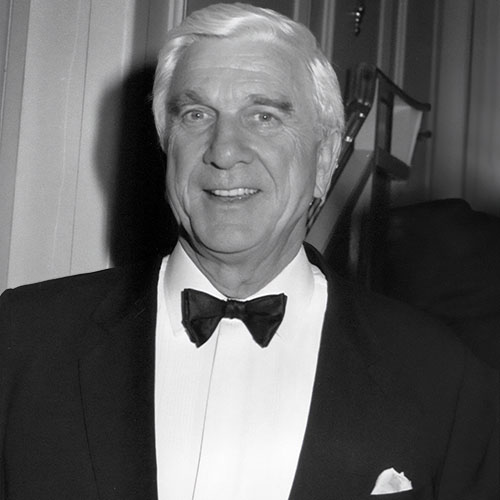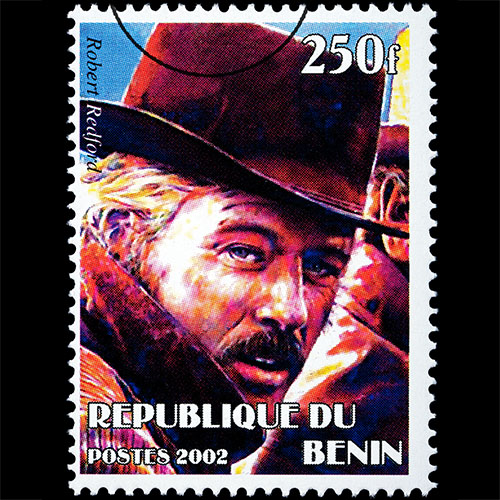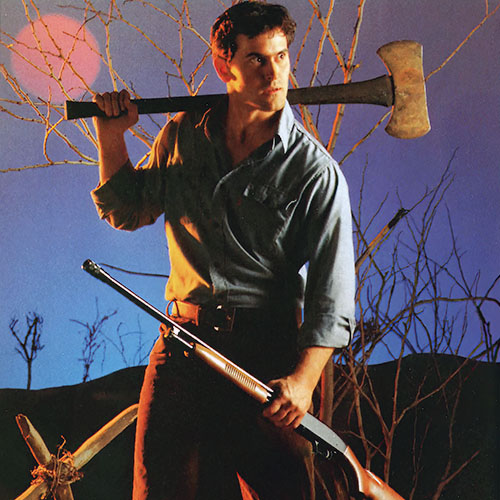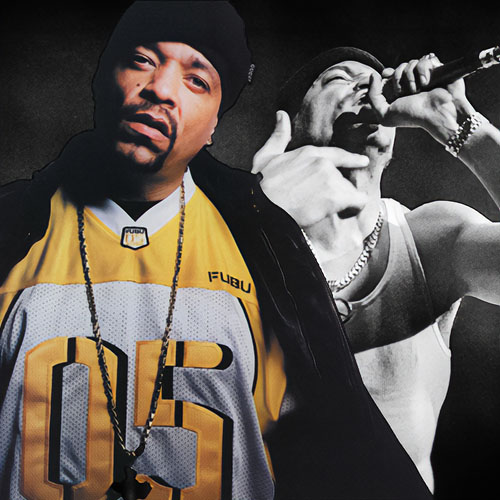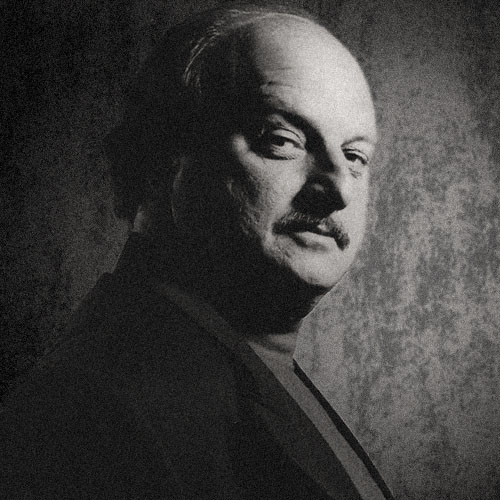Despite his success with his subversive Mr. Show and on the Emmy-winning sitcom Arrested Development, David Cross still feels the need to impress everyone, though you’d never guess it from his in-your-face humor.
A Mighty Cross to Bear
A sticker on the door of David Cross’s East Village apartment in New York City reads WARNING: YOU’RE ABOUT TO HAVE AN ORGASM. Another is emblazoned with the words MY KIDS THINK I’M AN ATM. Both convey the type of irony on which Cross thrives.
True, the balding, bespectacled 40-year-old comic is hardly a sex symbol, and he has no children. In fact, he begins his recent comedy CD It’s Not Funny with a sketch about how rude it is of his friends to be having kids. But Cross isn’t the intolerant, child-hating curmudgeon his sketches would suggest. His apartment looks out on an elementary school, and throughout the day, even when his windows aren’t open, the sounds of playground revelry can be heard. “At first I thought it would drive me nuts,” he says, “but it’s really heart-warming and endearing to look out my bedroom window and see the doors of the school open at recess and all the kids stream out, screaming at the top of their lungs about nothing in particular, just to scream. It’s so funny the way they zip around with all that crazy energy only kids have.”
In blue jeans, sneakers, and a white T-shirt bearing a picture of Bill Clinton, Cross looks pretty much the same as he did when he was living in Boston on $500 a month. That was 15 years ago, long before he moved to Hollywood and became a celebrated anti-comic. Since then he has worked as a writer on the short-lived The Ben Stiller Show; launched the cult sketch-comedy HBO series Mr. Show with sidekick Bob Odenkirk; released the hilarious left-wing comedy CDs Shut Up, You Fucking Baby!(2002) and It’s Not Funny (2004); and created a controversial behind-the-scenes DVD, Let America Laugh(2003).
Despite his success, Cross still feels the need to impress everyone, from close friends to journalists. At one point in our conversation, he comments, “I gotta say, I haven’t been that funny in this interview, and I feel bad about that.” And while his comedy is frequently harsh and confrontational, he winces with pain every time a critic or a heckler takes a shot at him. “I really like music, so I see a lot of shows,” he says, “and one thing I’m really jealous of is how loud these guys can be when they play. My comedy is pretty personal and honest in the sense that it means something to me. When I finish saying something, there’s silence. And I would love to be able to turn up the amps, turn up the guitar, and create a wall of sound so I could say these things and not have to hear anyone say, ‘Next! You suck! Not funny! Heard it!’”
If a man’s living quarters reflect his ego, it’s clear that celebrity has not gone to Cross’s head. His apartment resembles that of someone half his age. There’s a bike by the door, racks of CDs against the walls, a couple of framed photos of strippers, a wine rack, a large TV, and Xbox games strewn about. Only the three modern-art canvases reveal an aesthete with a sizeable bank account.
The floor of the office where Cross does most of his writing is filled with old comedy albums — Lenny Bruce, Bill Cosby, Richard Pryor. In the corner of the room, there’s a surreal painting of Cross and Odenkirk standing next to a porno-store marquee. “Bob had that made from a photo that was taken somewhere in the Midwest,” Cross recalls. “It’s funny, because it really doesn’t look like us, and the artist painted the sky all these strange colors. But I like it.”
During a 90-minute interview, Cross speaks candidly about his in-your-face comedy, his dysfunctional upbringing, frustrations in Hollywood, watching himself have sex, and the guy who pissed on him after a show.
You’re on Arrested Development, you’ve been on Bravo’s Celebrity Poker, you’re working on a Showtime pilot and a Mr. Show-style movie, and you’ve got a new comedy album. Are you afraid of being overexposed?
Some people might think I’m overexposed and it’s time for the inevitable backlash, but I’m not taking it personally. Removing myself from the situation, I’ve felt that way about other entertainers before. It’s like, “Enough already, I get it. You’re everywhere. Shut up already.” So I understand that, but at the same time, it’s not going to change anything. I’m always going to keep working.
You were recently ranked by New York Press as No. 19 in its annual “50 Most Loathsome New Yorkers,” 27 slots above Michael Gansas, the captain of the Staten Island ferry that crashed into a pier in 2003, killing 11.
That blew me away. I guess some people regard me as hypocritical. I’m the guy who complains about shit and calls bullshit on a bunch of stuff. But yet I’m also doing shots backstage at the White Stripes concert. There’s a hypocritical feel to shit like that. Also, your lifestyle changes when you start making money, and nobody likes a rich whiner.
On your most recent CD, It’s Not Funny, you make graphic Jokes about racist Republicans, incest, homosexuality, poverty, and 9/11. Is anything taboo?
I think when you make fun of somebody who hasn’t done anything wrong and is a victim and is defenseless, then that’s not funny at all. Pretty much everything else is fair game. I have a different sense of humor than other people, and I can laugh in public about stuff people feel is wrong to laugh about in public. But they will laugh if it’s just them and someone else whispering in a cubicle or in a movie theater as the lights go down. We all laugh about that stuff, and we do it as we’re saying, “Oh, man, that’s just wrong. Dude, that’s so wrong.” I have no qualms in making that a public laugh.
You’ve been accused of being mean.
That happens a lot, and it’s a little dismaying. A lot of that happened because I did a DVD called Let America Laugh. I think some people thought it would be a visual representation of my stand-up, and that’s exactly what I didn’t want it to be. It would have been exploitive to put a CD of my comedy out, then put the DVD out, so I did something totally different: a document of behind-the-scenes stuff. It’s not supposed to be all that funny, and some of it is me being obnoxious. We had hours and hours of footage of me not being mean at all. People were telling me how great I am and everyone was hanging out and enjoying themselves. Well, who the fuck wants to see that? I chose to put footage out there that shows me in a negative light, because I’ve never been afraid of that.
Do you get a kick out of being seen in a negative light?
It depends. If it’s by people who think I’m too inflammatory or that hate me because of something I strive for, then that’s great. I like purposefully pushing buttons or being mean to Christians. But if I’m shown in a negative light for parts of my personality that are deficient, then that kinda sucks. When people kind of nail me, it’s like, “Awww, man. You found out. You found out I’m a hypocrite. Fuck.”
What’s one of your pet peeves?
I fucking hate overly politically correct people. And mostly they’re these ultra-liberal, uptight, humorless idiots. Like, say one of these people was telling a story about a racist, and they say, “And then he used the N word.” That kind of thing drives me fucking crazy. The word is nigger. I grew up in the South and then I moved to Boston, and heard it quite a bit. And it’s usually used with such venom and hate and viciousness, so I understand why people find it coarse and unpleasant and evocative of all these awful things. But when you are referencing someone else saying it, it’s okay to say it. I’m not going to mistake you for a racist or someone who has this vicious agenda. So if someone says “the N word” to me, I’ll say, “Oh, you mean nigger.” And everyone gets all uncomfortable because I said the word out loud.
“With almost any other business, you can say ‘Hey, how would you like to make a million dollars?’ and they would be very enthusiastic. Not Hollywood.”
Have you ever been threatened for something you’ve said?
Yeah, lots. Nine out of ten times it’s for religious stuff. I had a large glass ashtray whipped at my head years ago at Stitches [comedy club] in Boston. Another time I was playing Baton Rouge, Louisiana, and people stood up and started slowly smacking their fists into their palms like they wanted to kick my ass, so I had to run offstage and wait in the greenroom until these guys were escorted out. And when I finished the show in Washington, D.C., where we taped Its Not Funny, security told me that there were people waiting outside the club for me. So they had to put me in the office until everyone left.
Were you ever physically assaulted?
This guy peed on me when I was opening for the Strokes and Guided by Voices [in 2001]. He was really fucked up, and I think I bummed him out, so he peed on me. That was the last fight I got into.
Did you beat him up?
Not really. And by not really, I mean not at all. I got in a few totally spazzy shots, and I think I hit him behind the ear. I was just flailing. I was so angry, and I actually hurt myself. I jumped up and tried to kick him with my left leg, and he had a boot on. He blocked it, and I kicked into his boot and it cut the side of my leg. I still have a scar from that.
What motivated you to pursue comedy? Were you compensating for personal weaknesses or deficiencies?
Look, man, I’m all about getting laid, and I don’t play an instrument, so what else could I do? [He pauses for a laugh.] Actually, I hate participating in an analysis of comedy, but, reluctantly, I suppose I have to admit that it was a bit of a coping mechanism. I moved around a lot growing up, and even in those places we moved to, we moved around. So I was in about ten schools by the time I was in tenth grade, if not more. You learn pretty quickly that if you don’t establish who you are immediately, everybody defines you as the nerd. But if you’re funny and a nerd, that’s okay. That’s a lot better than just being a nerd.
Are you a people person?
I’m more an Us magazine person. Thank you, good night.
You seem kinda antisocial.
I like hanging out with my friends and drinking all night and going to shows. So if I’m on the road with friends, it’s great. But half the time I’m by myself, and I go right back to the hotel after the show. I’ve played a few colleges where you run into a guy who goes, “Dude, my friend Buddy is having a party. Wanna come?” And I’ve made the mistake of going, and it’s never good. It ends up being a house party somewhere, and you’re seven miles away from where you’re staying, and you wind up answering questions you’ve answered a zillion times before. You’re supposed to be on and funny and they’re all psyched that the guy from Mr. Show is at the apartment and they’re calling their friends to ask you about sketches you did years ago. It’s just awful.
You must get a lot of girls coming backstage impressed by your charm and wit who are interested in you.
I have a girlfriend, so I don’t fool around.
Do you take porn on the road to keep you warm on lonely nights?
No, I’ve got some at home. It’s right in a case that’s out in the open. I don’t hide it. I like porn. I use it to masturbate. And that’s its place, and that’s good. I have no puritanical or morality issues with it. I’m sort of weirded out by all that super-hard, mean “stick a woman’s head in a toilet bowl and say ‘Who’s your daddy’ kind of stuff. That’s not for me.”
Does your girlfriend like porn?
No, she’s not that into it. We have watched some together, but when you watch it with somebody else, it gets kind of silly. It loses all eroticism. You’ re painfully aware of the ridiculous acting, and sets that jostle, and bad sound, and what people look like when they’re faking orgasms.
What people look like when they’re really having orgasms is pretty absurd.
Yeah, we’ve taken digital photos of ourselves, and we’ve talked about filming ourselves having sex, but that’s the underlying reason I would not do it. You’ve seen her face during orgasm, and she’s seen your face, but then you’re watching yourself doing that “Ah-ah-ahhh” thing, and man, that could be really upsetting and deflating.
You were born in Atlanta?
Yeah, but I lived in various places in Florida, Connecticut, and New York, all before my tenth birthday.
What did your folks do?
My dad just got fired a lot. He wasn’t a true con man, but he floated around from job to job, and he was very irresponsible. My mother didn’t do anything until he left us when I was a teenager. Then she got a job in a photocopy place. We were really, really poor. And there was a lot of family dysfunction between my mom and my two sisters. There was a five-year period when there were dips into tragic, absurd, you-couldn’t-make-this-shit-up type of irrational behavior from different people in my family. Then when I turned 19, I went away to college in Boston.
“I guess some people regard me as hypocritical…. Your lifestyle changes when you start making money, and nobody likes a rich whiner.”
When did you start doing stand-up?
The first time I did an open-mike night was two weeks before my 18th birthday. I was doing really strange, weird shit. I did open mikes around Atlanta for a year and a half before I ever got any work at all. But man, that first time you get $20 and you’re 18, man, that’s awesome. I actually got paid to do stand-up. It was pretty cool.
Who are your biggest influences?
Pearl Bailey, Minnie Pearl, Minnie Riperton, the Rippingtons, Jack the Ripper. [Pauses and sighs] I have early influences like Andy Kaufman, Steven Wright, Steve Martin, Lenny Bruce, Jonathan Winters, Richard Pryor, and George Carlin. Then there are my latter influences, which are pretty much just my friends and my peers. They’ve always inspired me and influenced me. Oh, and Penthouse has always been there for me. As a youth, it comforted me. It watched me grow up, stayed underneath my bed for many, many years, asking nothing in return.
You left Boston to work for The Ben Stiller Show in Los Angeles. Was that your big break?
Yeah, pretty much. I was in Boston in 1990 and I had a comedy group there, and we did sketch comedy with some of the running themes that ended up years later on Mr. Show. I was friends with Janeane Garofalo, who had gone out to Los Angeles at that point. And she got me to submit some stuff for the Stiller Show, and they hired me as a midseason writing replacement. I was thrown in the fire on the first day.
Was it all you ever dreamed of? Did it pass the Dave Cross Test for Excitement?
No, it was intimidating as hell, but I met Bob Odenkirk through that. But we weren’t very close at first. In fact, he was particularly unfriendly. He wasn’t mean; he just was not interested at all in helping me out.
Why not?
I think I was kind of cocky. I had this bullshit purity ethic. I thought, What I do is real, man. I acted onstage. This is TV. This is easy. Who cares about a Die Hard parody? I don’t. That’s not real. Not that I said that out loud, but I kind of implied it in my attitude at first. But I shook that pretty quickly. I had to, or I never would have made it. And gradually, Bob and I got along better.
Did you feel like the bottom had fallen out when The Ben Stiller Show ended after a single season?
Not at all. I had about $20,000 saved up, and I had been used to living off $500 a month, so I was just hanging out and doing stand-up. It was great.
When did you and Bob get the idea for Mr. Show?
Bob came with me to the Just for Laughs festival in Montreal, and we did this thing called the “Late Night Danger Zone.” We were just fucking around and writing little bits, and they went over really well, so we got together back in L.A. and started doing these sketch shows, which we would do in various places around.
When did you hook up with HBO?
It was another two years. We invited different people to check out the show, and HBO offered us a deal.
The show has developed a cult following. What about it inspired such lasting devotion long after your four seasons came to an end in 1998?
It was the forum that best suited our abilities: a quick sketch show that used all sorts of media. And it set a very high standard for what was to be expected from me and Bob. I don’t know if we’ll ever be able to match it. It’s like the Monty Python guys. They all did lots of good work, but it will never compare favorably to what Monty Pythons Flying Circus was and what it meant culturally.
At one point there was supposed to be a Dave Cross Mr. Show movie. What happened?
We wrote five different versions of a script that nobody wanted, which eventually became the piece-of-crap movie Run Ronnie Run! We initially had the Ronnie Dobbs character leading us through these different sketches, and the movie was much closer to what the show was like. But we couldn’t sell it. Finally it was shot as a much more studio-friendly Adam Sandler-esque film which we weren’t given any input in, and which went straight to video.
Didn’t you try the sketch idea one more time for a film?
We wrote another series of movie scripts, also rejected by every studio. We’ve rewritten and rewritten, and we can’t get it made. Now we’re talking about spending our own money to film a scene and see if that helps sell the movie.
You have a killer track record. Why won’t a major studio embrace Dave Cross and take a chance on a Mr. Show-style film?
Bob said it best: Studios aren’t interested in making a million dollars. They’re interested in making tens of millions of dollars. Whereas with almost any other business on the planet, you can say, “Hey, how would you like to make a million dollars?” and they would be very enthusiastic. Not Hollywood. And that’s more frustrating than I can say, because I know there’d be an audience for the film.
Do you enjoy being on Arrested Development, which is more mainstream?
It’s the best, man. After all the trials and tribulations with trying to get Run Ronnie Run! made, getting it made, getting kicked out of the editing session, watching it be a piece of shit — all that stuff — it’s awesome to be on a show where all I have to do is go to a trailer, put on a strange outfit, glue a mustache to my face, and say these lines that some funny, smart writer labored over till three in the morning. Plus, I get paid better for one episode than I did for two episodes of Mr. Show, where I would write, produce, act, and edit, working ten hours a day, seven days a week.
Most of your work has been in television. Do you prefer that to working in the movies?
No, I’ll do whatever I can. If there’s a good movie with a director and a screenwriter that I’m excited about, I’ll do it in a heartbeat. But I only get one or two offers a year. I’ll audition for the cool stuff; I just won’t get it. And I’ve gotten offered a couple things I’ve turned down that were just too shitty. But I like working, and occasionally I’ll do some big dumb thing for a paycheck.
Like what?
Like Scary Movie 2 and Small Soldiers, which I did hoping they would lead to more work, which they didn’t.
Are you pretty confident about yourself and your abilities, or do you feel like your next job could be the last for Dave Cross?
Both, depending on what I’m doing. For the most part, I feel pretty confident, if for no other reason than I have literally a thousand different shows I can conjure up where I was really good and kicked ass. And believe me, I know when I’ve done a shitty job or a good job. I’m not one of those people who will come offstage and say, “Man, that sucked, I sucked,” just to get praise. People who do that are infuriating. But at the same time, I still have insecurities. When there are 15 hundred people laughing but there’s a guy in the corner shaking his head, he’s the one I’m going to focus on. I don’t know why. I can’t help it. Then I’ll just slink back home and cry myself to sleep.
Not exactly Bill O’Reilly, but perhaps equally cutting in his genre, we have always enjoyed Mr. Cross. Should you wish to catch up with Dave Cross today, you will need to be sure you have the Official One, however, because apparently there are a lot of people named Dave Cross, and more than a few of them own automobile dealerships. Feel free to check those out too if you wish. Maybe they have some hysterical bits on carburetors and catalytic convertors.
















